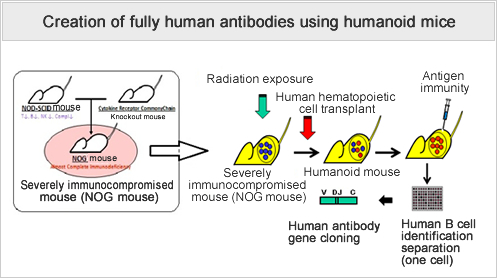Home > Research themes > Development of an efficient method for producing fully human monoclonal antibodies for clinical application
Main content starts here.
Development of an efficient method for producing fully human monoclonal antibodies for clinical application
Yasuto Akiyama, Chief of Immunotherapy Division, Shizuoka Cancer Center Research Institute
(FY2010-2012)
Aims and Expected Results of Research
In order to use antibody drugs as anticancer drugs, the problem of differences in antibodies between species requires the structure of an efficient human antibody. However, because of the difficulty of obtaining highly active human antibodies (100% human), current needs are not being sufficiently met.
In an attempt to answer this rapidly growing need for antibody drugs, our research aims to identify a fully human antibody gene that is cancer antigen-specific, and to further improve on rapid antibody production efficiency by establishing a foundation for the techniques of making an antibody by recombining existing antibody genes.

FY2011 results
- By combining the creation of human hematopoietic cell transplanted mice with antigenic protein immunization technology, we were successful in introducing human antibody titers for specific cancer antibodies.
- Utilizing single-cell antibody gene cloning, producing a human monoclonal antibody for use against specific cancer antibodies was shown to be possible.


